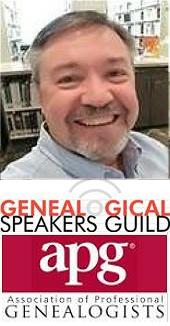|
 U.S. Genealogy Libraries : Wealth of Resources U.S. Genealogy Libraries : Wealth of Resources
by Robert M. Wilbanks IV, B.A.
Chief Genealogist & Historian, C.S.A.
genealogy@arizonascots.com
The internet has become an exciting and beneficial resource for conducting genealogy research. However, the fact is the internet barely touches the tip of the iceberg when it comes to locating resources and information in the pursuit of family history. The greatest amount of genealogy information still can only be found in hardcopy in a variety of repositories, as discussed in previous articles, such as archives, court houses and public records office. However, in addition to archives and courthouses, many private and public libraries provide a great wealth of genealogy resources.
The United States has hundreds of specialty library collections for genealogy research from coast to coast. Most small city and county public libraries have “local history” collections and research rooms with genealogy resources. However, there exists a large number of U.S. libraries with vast amounts of resources for genealogy and local history. Here is a short listing of just a few of the most notable libraries in the U.S. with vast genealogy collections:
The Family History Library in Salt Lake City is the world’s largest genealogical library, with hundreds of branch libraries all over the world. This private library is open to visitors for free. The collection consists of over 1.4 million rolls of microfilm, 600,000 books, serials and maps, the library has 550 computers and 200 microfilm and microfiche readers to research. 45 staff and 550 volunteers can help you with your research, with classes on various subjects every day.
The United States Library of Congress, in Washington D.C., has a dedicated Local History & Genealogy Reference Services with a research/reading room just for genealogists. It has one of the world's premier collections of U.S. and foreign genealogical and local historical publications. The Library's genealogy collection began as early as 1815 with the purchase of Thomas Jefferson's library, and now has over 50,000 published genealogies and 100,000 local histories.
Since its founding in 1896, the Library of the Daughters of the American Revolution, Washington D.C., has grown into a specialized collection of American genealogical and historical manuscripts and publications, as well as powerful on-site databases. The DAR Library collection contains over 225,000 books, 10,000 research files, thousands of manuscript items, and special collections of African American, Native American, and women’s history, genealogy and culture. Nearly 40,000 family histories and genealogies comprise a major portion of the book collection, many of which are unique or available in only a few libraries in the country.
The Library of the New England Historic Genealogical Society in Boston is one of the nation’s leading research centers for genealogists. It houses millions of documents, manuscripts, records, books, microfilms, photographs, artifacts, electronic resources, and other items that preserve history. There extensive website will help you get the most out of your library visit.
The Genealogy Center of the Allen County Public Library, Fort Wayne, Indiana, is nationally recognized. It is a very unique and valuable resource for the genealogical community nationwide. They have one of the largest research collections available, with records from around the world. The Library staff specializes in genealogy and are very helpful.
The Dallas Public Library Genealogy Section, Dallas, Texas, contains one of the largest and most comprehensive collections for family history research in the Southwest. Over 50,000 individuals visit annually, with many from out of the state. The collection includes all states and counties of the U.S. Many foreign resources are also available.
The Newberry Library, Chicago, has been collecting genealogy and local history materials since 1887. Staff at the Genealogy and Local History desk can help you explore the Newberry’s rich collections of family histories, local histories, censuses, probate, deed, court, tax, and cemetery records, military, periodicals, genealogical guides and more.
The Southern History Department of the Birmingham Public Library, Birmingham, Alabama, is a collection that covers every facet of Southern life and culture. Their collection is extensive with regard to genealogy and local history for the southeastern States. If researching Southern local, state, or regional history, arts and sciences, geography, genealogy, or folklore, you can find information here. Extensive newspaper clipping files on local and regional history can be searched for information along with periodicals and online databases. They have a notable Cartography Collection, and Rare Book Collection of early Americana.
The Clayton Library Center for Genealogical Research, Houston, Texas, is consistently named one of the best family history research libraries in the U.S. Family history research materials are available in print, microprint and online. Clayton Library has a national and international collection of records and resources. Resources available include book, microprint, and/or electronic formats. Many records are being digitized and made available through various electronic databases.
In partnership with the Orange County California Genealogical Society, the Huntington Beach (California) Central Library houses the OCCGS Genealogy Research Room. Located in Huntington Beach's beautiful Central Park, the Library is home to the Genealogy Collection maintained and developed by OCCGS. The Collection is on the lower level of the library and contains over 23,000 volumes. Open during normal library hours, it is for reference use only.
A more extensive list of genealogy libraries around the U.S. can be found at this “Directory of Genealogy Libraries in the U.S.” listing libraries by state with addresses and links to their web pages.
This is another of a series of articles in which I show you the basics of searching for your family history, discussing the use of family records, public records, and online resources nationally and internationally, etc. The previous articles are now available on the Genealogy Section of this website. See “Genealogy” in the menu options at the top of the web page.
|